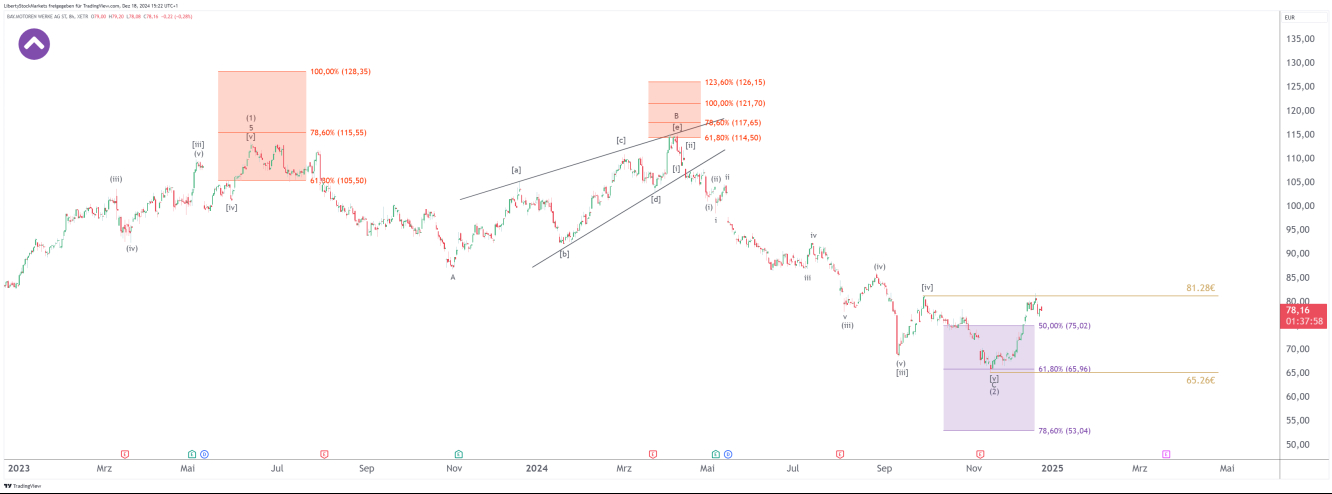While Germany's carmakers are struggling with challenges – job cuts, weakening sales figures and political uncertainties – BMW (WA:BMW) is focusing on innovation and drive. With the introduction of the new electric car generation ‘Neue Klasse’ in autumn 2025, BMW is demonstrating what progress can look like in times of upheaval.
The contrast with Volkswagen
While Volkswagen AG (LON:0P6N) is dominated by cost-cutting measures and factory closures, BMW is focusing on ambitious projects. The ‘New Class’ is the largest investment in the history of the Munich carmaker, estimated at almost 10 billion euros. This new model series marks a radical change: away from compromises, towards fully electric vehicles.
And the stock – Is it also uncompromisingly bullish?
On 30 April 2024, we announced on our website that BMW's stock would drop sharply.

The target that we issued at the time was in the purple box between €75.02 and €53.04, with our ideal target being €65.96.
Now let's take a look at the current BMW chart:

A picture is sometimes worth a thousand words.
Revolutionary concept for the future
Expectations are high: BMW promises 30% more range, faster charging times and lower production costs. Technological innovations such as holographic displays and state-of-the-art assistance systems are set to revolutionise not only the ‘New Class’ but the entire model portfolio. These electric cars represent a fresh start – similar to the first ‘New Class’ of the 1960s, which once saved BMW from ruin.
BMW CEO Oliver Zipse is pursuing a clear strategy: no fear of risk, but bold investments. While other manufacturers are faltering, BMW is increasing sales of its electric cars – and is leading the pack of German manufacturers in the field of electromobility. With a targeted mix of retro design and futuristic technology, the Munich-based company is probably meeting the tastes of customers better than its competitors.
Symbolic restart
BMW has not only invested in new technologies, but also in new production facilities, including a state-of-the-art plant in Hungary. At the same time, the main plant in Munich will phase out combustion engine production by 2027 – a symbolic step into the electric future.
Unlike other manufacturers, BMW did not focus on pure electric cars too early, but waited until now and tested the market. Despite this delay, BMW is leading the statistics. The Munich-based company was able to increase the share of electric vehicles in total vehicle sales from 13.4% to 16.8% between 2023 and 2024. Mercedes and VW, on the other hand, are shrinking (Mercedes from 10.6% to 9.3%, VW from 7.9% to 7.8%).
A ray of hope for the German automotive industry
BMW shows that even in difficult times, bold decisions and clear visions are the basis for success. While VW and Mercedes are struggling, BMW is setting new standards – and giving the German automotive industry a much-needed ray of hope.
Disclaimer/Risk warning:
The information provided here is for informational purposes only and does not constitute a recommendation to buy or sell. It should not be understood as an explicit or implicit assurance of a particular price development of the financial instruments mentioned or as a call to action. The purchase of securities involves risks that may lead to the total loss of the capital invested. The information provided does not replace expert investment advice tailored to individual needs. No liability or guarantee is assumed, either explicitly or implicitly, for the timeliness, accuracy, appropriateness or completeness of the information provided, nor for any financial losses. These are expressly not financial analyses, but journalistic texts. Readers who make investment decisions or carry out transactions based on the information provided here do so entirely at their own risk. The authors may hold securities of the companies/securities/shares discussed at the time of publication and therefore a conflict of interest may exist.
